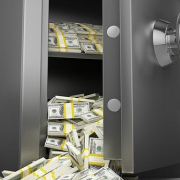Is Your Checking Account Too Fat? How To Tell And What To Do About It
 Americans are stuffing their checking accounts with more cash than ever before, and that may not be a good thing.
Americans are stuffing their checking accounts with more cash than ever before, and that may not be a good thing.
The average checking account balance was $5,459 in the first quarter of 2015 — more than double the norm prior to 2008 — according to the economic research firm Moebs Services. This could be partly due to unease over the economy; money in a checking account is easy to access when you need it. Consumers may also be keeping balances higher to avoid low-balance fees. More banks have begun charging such fees in the wake of the recession.
But keeping too much cash in a checking account means you’re missing out on higher returns elsewhere. So how do you decide how much is the right amount?
Chart Your Account Habits
First, get a clear view of how much money you spend each month. Instead of conjuring up an estimate, keep a daily spending log for three months. Track your purchases and include bills and other payments that are automatically deducted from your checking account, like gym membership fees or loan payments.
“Money is sometimes spent without much thought and just seems to disappear,” says Andy Tilp, a financial adviser in Sherwood, Oregon. “If you record every dollar, you can see exactly where it’s going.”
Once you know how much cash your account absolutely must have — most experts recommend four to eight weeks’ worth of living expenses — add 30%. Why? Banks make a lot of their money off fees charged to customers for overdrawing on their account, for bouncing a check, or even for not having quite enough money in the account in the first place. That doesn’t mean you should make it easy for them.
If your bank waives fees for balances of at least $1,500, keep another $500 in your account for an additional layer of security, says Johanna Fox Turner, a financial adviser in Mayfield, Kentucky. That way, an unexpected expense or a one-off purchase won’t drag your balance into dangerous territory.
Put The Rest Somewhere More Profitable
Now that you’ve arrived at how much you’ll keep and maintain in your checking account, direct your other money someplace else. Why? Most checking accounts don’t earn any interest.
Consider opening an additional retirement account or increasing your contributions to existing retirement funds. Another option is opening a high-yield savings account. Many online-only banks offer interest-bearing checking accounts that could also serve as excellent places to store cash. With these and other options, your money won’t simply accumulate — it can grow.
Keeping just the right amount of cash in your account ensures that you can cover your daily needs while also tackling your long-term financial goals.
The Bottom Line
- Keep a spending log for three months so that you know all the ways that money comes into and flows out of your checking account.
- Once you settle on a figure, add 30% to it. This is to cover one-off purchases that otherwise might cause you to overdraw your account or dip below a minimum requirement.
- Look into a high-yield savings account as a place to store the rest of your money. Or a retirement account. Or a CD. Or, really, just anywhere besides your basic checking account.
Source: USA Today

